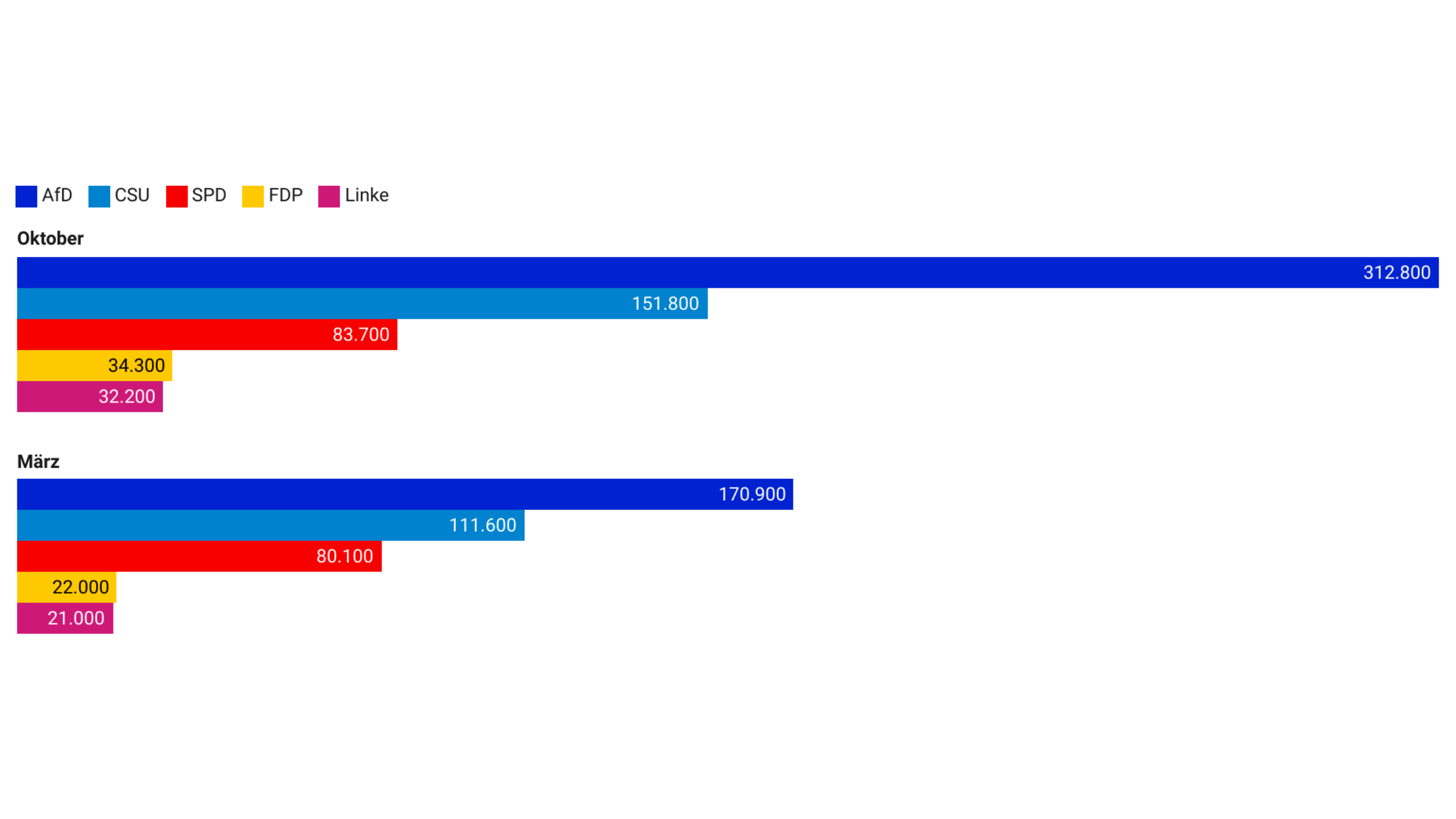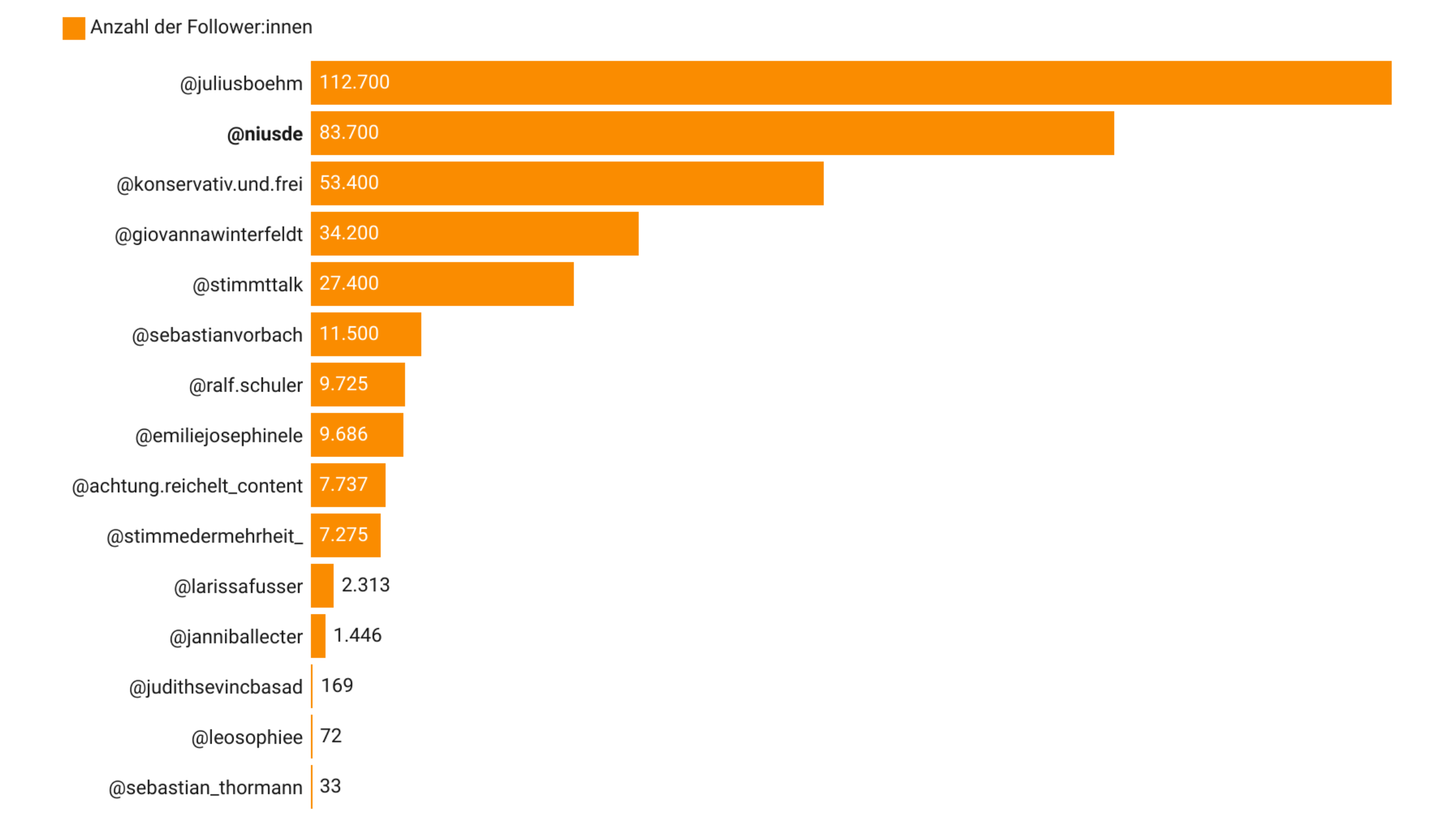
“The federal government hates you. It wants to take away what you’ve earned for yourself.”
That's what Maximilian Krah tells his community in a video on TikTok. An MEP for the far-right Alternative für Deutschland (AfD), he is the party’s lead candidate for the European elections in 2024. On TikTok, he has around 37,000 followers. His videos are watched up to a million times.
Jolan Geusen studied media and political science and wrote his thesis on the AfD on TikTok.
Krah’s account is like many others on the platform: with comparatively few followers, his content has a huge reach. This is all made possible through TikTok's algorithm and its For You Page (FYP) — which especially benefits accounts with polarizing content.
21 Million Users in Germany
The ideas behind these technical features come from China. The company ByteDance bought the social network musical.ly, also from China, and took over its features and ideas, including the possibility to post videos accompanied by music. A new player in the social media landscape was called into being: TikTok. Since the app arrived on the market, its user numbers have risen astronomically. With nearly 2 billion users worldwide, TikTok is where young users in particular have found their digital home.
According to the platform, in Germany, around 21 million people use TikTok on a monthly basis. The 2023 Reuters Institute Digital News Report identifies its growth trend, as TikTok is increasingly relevant to the German population. While other social network platforms have lost users, the use of TikTok has increased. According to the report, the platform “is used by 12 percent of adult internet users at least once a week for any purpose in 2023”.
The Political Significance of an Apolitical Network
That said, in its beginnings, TikTok as a platform was explicitly uninterested in being perceived as a political platform, or in developing into one — at least according to former CEO[1] Alex Zhu in an interview with Der Spiegel. However, the new possibilities TikTok opens for presenting political content in a playful or entertaining way mean that in effect, the opposite is the case.
TikTok has long been far more than a platform for dance challenges and lip-sync videos. Increasingly, users consume news here, or they respond to political decisions and current events. The politicization of TikTok began around 2020, when TikTok users initiated the boycott of one of Donald Trump’s campaign rallies.
The line between news and entertainment on TikTok is becoming increasingly blurred. Recently, videos from the war in Ukraine demonstrated this clearly through their “meme-ification” of the conflict’s representation online. Similar techniques have been used in relation to the conflict in the Middle East. On TikTok, users position themselves in relation to the conflict, criticizing the media or political decisions.
TikTok’s Most Important Features
Unlike many other social media platforms, TikTok has a special feature: the aforementioned For-You-Page (FYP). Here, users are fed one video after another — all they have to do is scroll. Each video is selected by the TikTok algorithm. Researchers compare this form of media consumption on TikTok with being in a “digital rocking chair” or constantly changing television channels.
What makes the FYP so special is that users principally do not see videos from accounts to which they have actively subscribed. Rather, they are exposed to content that the algorithm has selected on the basis of benchmarked user interest. In this way, TikTok algorithm creators have enabled videos to go viral, even without a pre-existing follower base.
Users can additionally activate the “duet” function for their content. This is a form of split screen that displays content, while at the same time allowing the user to react creatively. A well-known example of what are known as “duet chains” can be found under the hashtag #SeashantyTikTok, in which various users sing a song together without being in the same space.
Should creators on TikTok choose to use the “stitch” function, they can reuse clips from other TikTok videos in order to create their own mash-ups. Such mash-up content is then displayed in sequence. This feature makes it possible to add visual and auditory filters and effects, such as green screen, AI, and voice filters. The soundtrack of any given video can be used by other users, so long as this function has not been deactivated.
Alongside all the creative freedom and the many opportunities offered by TikTok, there are a few catches. One of them is TikTok’s dealings with community guidelines. Hate and racist content are, at times, deleted in the app, but only in a haphazard manner. Additionally, in Germany, the video platform clearly implements a systematic filter for at least 20 words. Certain comments are therefore not published, as demonstrated by research by German television networks Norddeutscher Rundfunk (NDR), Westdeutscher Rundfunk Köln (WDR), and Tagesschau.
The issue is that when TikTok blocks comments, users are not informed. In other instances, however, TikTok is less exacting. A huge amount of misinformation circulated on the platform about Hamas’s attack on Israel. The EU Commission issued a warning to the online service and demanded measures be taken.
Right-Wing Populism on TikTok
TikTok is not only plagued by misinformation and hate speech, but also by right-wing populist narratives and forms of expression. As with so many other social media platforms, posts on TikTok with polarizing content are more likely to be commented on. More comments mean that the content is afforded more reach by the algorithm. For example, users criticize the political elite, such as the German federal government or the EU (scapegoating), disseminate (racist) prejudices against migrants, and portray German society as a Volk, an ethnic nation or homogenous mass.
Currently, AfD politician Maximilian Krah is running a campaign for the 2024 European Parliament elections. He has long had a TikTok profile, but since June 2023, his use of the platform has markedly increased. In his videos, he blames “green policy” for the fact that pensioners gather bottles from the street for income. He states that the Greens are “abolishing everything Germany stands for”. According to other clips, “real men are patriots, that’s how to keep your girlfriend”, and “ARD and ZDF [public broadcasting services] are leftist propaganda”.
Not everyone agrees with him, as the comments to his posts show. But this is precisely what Krah profits from: more comments mean that the algorithm will play his videos even more frequently.
Example 1: The AfD
Krah is no isolated case. The AfD has realized that TikTok can be used in combination with right-wing populist strategies to support its aims. This can be demonstrated simply through comparison with other parties in the German parliament.
In October 2023, the party profile of the AfD parliamentary group had the most followers on TikTok by far. The huge growth of the AfD community is noteworthy here; between March and October 2023, the party’s account accrued 142,000 new followers — an increase of 83 percent.
The Christian Democratic Union (CDU) and the Greens neither have TikTok accounts for their parliamentary groups, nor do they maintain profiles representing their respective parties. Only individual politicians and some state-wide party branches are active on the platform. The TikTok interactions of parties and politicians was researched in detail in a study published by the Rosa Luxemburg Foundation in 2021, what is presented here is only a brief summary of the study.
The AfD has long had a party TikTok account. However, it was blocked on 6 May 2022 by the platform. In a press release, the AfD claimed that they were not provided with a concrete reason.
In January 2023, the platform hosted 134 accounts in total with direct connections to the AfD, either because they were used by party politicians, or by party branches or groups in parliament. The CDU/CSU and Social Democratic Party (SPD), supposedly “people’s parties”, cannot keep up with this presence. Many AfD members sitting in the German parliament are also active on TikTok. Of the 78 AfD delegates there, 41 of them had an individual TikTok account in early 2023. AfD delegates in the individual German state parliaments are likewise represented in high numbers on the platform.
The AfD draws on a number of different measures to disseminate its content — in part through the support of external forces. Profiles attached to the party strategically communicate political content on TikTok. Individual profiles of AfD politicians, however, do not always immediately bely the user's party-political affiliation at first glance. These are known as “non-evident” profiles.
Such AfD-affiliated accounts draw mostly on pre-existing content; only occasionally are they specifically tailored to the logic of TikTok. In an interview with the television program Die da oben, political advisor Martin Fuchs spoke of a “Facebookization” process. Only a few profiles draw on typical TikTok elements such as added music, the “stitch” or “duet” functions, filters, and short, sharp content styled for the platform.
Alongside these party-affiliated accounts, the AfD’s presence is amplified by TikTok profiles and external accounts aligned with the party’s values. These include AfD fan pages, influencers, and edit accounts, in which rehashed, short videos of AfD politicians — primarily Alice Weidel — are cut with viral music. In this way, content and statements of the AfD are spread by accounts that are not directly linked to the party. These edit accounts custom-cut content to feed the TikTok algorithm, provoking others to glorify and celebrate Alice Weidel, while depoliticizing her content by framing it as entertainment.
Example 2: The Nius.de News Portal
Polarizing content containing right-wing populist statements is not spread solely by the AfD. The news portal Nius, launched in July 2023 by a group that includes former BILD tabloid editor Julian Reichelt, also plays a role. His team involves a number of journalists who have worked for news outlets such as the Axel Springer media company, Berlin-Brandenburg Broadcasting (RBB), Der Spiegel, and Focus.
Nius has been active on TikTok since March 2023. The videos of the Nius editorial team can be accessed by large numbers of users on their FYP. Analysis from the media magazine Übermedien has shown that Nius representatives thereby tap into right-wing populist narratives and push them to their extreme, misappropriating and decontextualizing information. Alongside innocuous content on driving license awards, swimming with sharks, or Halloween pranks, @niusde displays videos chastizing the apparent hubris of the Greens, bemoaning the lack of German flags on German Unification Day, or criticizing the work of the Tagesschau public TV programme.
Recurring messages suggest that the federal government and the ruling parties — the SPD, Greens, and Free Democratic Party (FDP) — are incompetent, and that they want to “restrict our personal freedoms”. The openings of the videos are mostly exaggerated and sensationalist in order to attract the attention of TikTok users. The style of the videos, too, is generally adapted to TikTok’s viewership. Nius.de makes use of green screen and fast-paced content, voicing strong opinions and encouraging users to interact with their videos by creating their own content.
Particularly striking is the sheer volume of videos. At times, the account can publish up to nine videos per day. This has a clear impact on the profile’s reach. Although the account only has around 80,000 followers, the TikTok algorithm ensures that the videos are seen by far more people. @nius.de has already received 2.8 million likes (counting up the likes on all its videos).
(Kopie 45)
Nius’ content does not find its way to TikTok’s FYP solely via the user’s main profile — a vast network of Nius creators also publish videos on their own profiles, as do profiles connected to other Nius channels, such as Stimmt! Der Nachrichten-Talk [True! News Talk] or Achtung, Reichelt! [Attention, Reichelt!]. This strategy is effective: such profiles rapidly gather high numbers of followers, as does the Nius account itself.
Why is Right-Wing Populism So Successful on TikTok?
The examples of Nius’ and the AfD’s use of TikTok demonstrate clearly the extent to which the platform’s algorithm rewards polarizing content. More comments mean more interaction — and more interaction means more reach.
But it is not only the algorithm and the FYP that are decisive for both players’ success. The effort that AfD politicians and Nius journalists put in also pays off. For Nius.de, it is about the many videos that the account publishes on a daily basis. For the AfD, this has more to do with the sheer volume of profiles that help to spread its content.
The AfD has been investing for some years in additional media resources, for example in its own “newsroom”. In doing so, the party works to influence reporting on its operations. Its presence on TikTok is in keeping with this broader concept. Meanwhile, the other political parties represent a digital backwater. Nius.de, too, is the product of huge (financial) investment.
While many AfD profiles reuse content, often ignoring standards for online content in the process, there are exceptions, such as the lead candidates of the AfD for the upcoming European elections. Maximilian Krah produces short, sharp content, usually opening with provocative statements or questions – not unlike Nius.de. Additionally, he pays attention to comments made on his videos. At the end of his campaign, the success of this strategy will surely be seen in the European election results.
Translated by Sonja Hornung and Anna Dinwoodie for Gegensatz Translation Collective.

